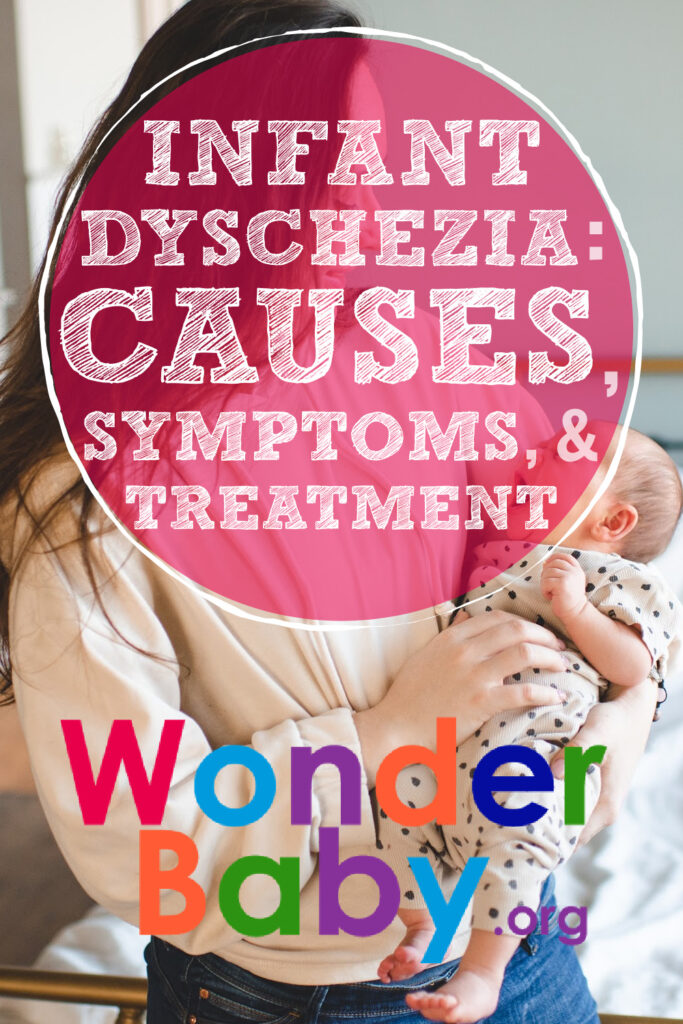Infant Dyschezia: Causes, Symptoms, and Treatment

- Infant Dyschezia is one of the most common functional gastrointestinal disorders in newborn babies.
- Also known as Grunting Baby Syndrome, Infant Dyschezia is a condition experienced by some infants that causes crying and straining for at least 10 minutes before the successful (or unsuccessful) passage of a bowel movement.
- The condition is caused by a lack of coordination between the increased pressure that occurs in your baby’s belly when they have to poop and the relaxation of the pelvic floor muscles to expel the poop.
- Infants with dyschezia usually outgrow the condition and begin to have regular bowel movements without crying by three months old.
If you notice that your baby cries, grunts, or strains for 10 minutes or more before having a successful or unsuccessful bowel movement, your baby may be experiencing something called dyschezia. Dyschezia simply means difficulty pooping, and it is a common, self-limiting condition caused by the lack of coordination needed for a successful bowel movement.
It may be challenging to watch your child struggle, but dyschezia does not usually cause your baby any pain or discomfort. However, until your baby can learn to have normal bowel movements without straining, here is everything you need to know about infant dyschezia.
Infant Dyschezia: What Parents Need to Know
Infant dyschezia is a condition experienced by some newborns during their first few months of life. It is caused when your baby has trouble coordinating the abdominal pressure that occurs when they have to poop with the pelvic floor muscle relaxation needed for the poop to come out.
Infant dyschezia can be experienced by newborns anytime within the first few months of life.
Any infant can experience dyschezia, and whether your baby is formula fed or breastfed doesn’t matter. The good news is that babies will eventually learn more about how their bodies work as they grow and mature, and infantile dyschezia will resolve itself without treatment.
Many parents can confuse the symptoms of infantile dyschezia with the symptoms of constipation. The key difference between the two is that babies with infant dyschezia will eventually pass normal soft stools, and babies with constipation will pass hard, pebble-like stools.
It may appear your baby is in pain or experiencing discomfort when they have dyschezia, but in most cases, the condition is not painful. The reason babies with dyschezia cry is so that they can increase their abdominal pressure to learn to squeeze the muscles needed to poop.

What Causes Infant Dyschezia?
Dyschezia is caused by one simple thing: Immaturity. When infants are born, they have to learn how to do everything, including how to poop. For your baby to have successful bowel movements, they must learn to coordinate two bodily functions. First, they must learn to relax their pelvic muscles. Second, they must increase their abdominal pressure to squeeze out their stool.
The way babies learn to increase their abdominal pressure is by crying. This teaches them how to contract their belly’s so that they can pass stool. They cry, strain, and can even turn red until they eventually relax their pelvic floor and rectum enough for stool to leave the body. Some babies can cry more than others until they learn how to squeeze their muscles and poop without crying.
Signs and Symptoms of Dyschezia in Babies
There are several signs and symptoms to look out for if you suspect your baby is struggling with infant dyschezia. Some of the signs and symptoms can include
- Struggling to pass stool for at least 10 minutes
- Crying, grunting, or screaming while trying to poop
- Squirming or kicking their feet
- Turning red/purple in the face while straining
- Efforts may not always result in a poop
- The poop will look normal when it does come out (soft, seedy, or pasty)
What Is the Treatment for Infant Dyschezia?
Although it may be challenging to watch your baby struggle, the good news is that infants with dyschezia do not need any medical treatment. Babies will eventually learn more about how their bodies work and will outgrow their difficulties by about three months old.
If your baby cannot pass any stool or can only pass hard, pebble-like stools, your baby may be constipated. Your pediatrician will be able to discuss with you how to treat your baby’s constipation. Also, talk to your pediatrician immediately if your baby has blood in their diaper. Blood in your baby’s poop is a serious problem.

Parent’s Guide to Dealing With Infant Dyschezia
When our babies cry, it is only natural to want to soothe them. However, when it comes to infantile dyschezia, one of the best ways to help your baby is to wait and allow them to cry. This is because crying causes the abdominal pressure to increase so your baby can squeeze out a bowel movement.
Some parents find infant massage can help their babies poop a little easier. This is because massaging your baby’s belly helps to stimulate the abdominal pressure they need to have a successful bowel movement. Follow these simple steps to massage your baby’s tummy.
- First, lay your baby on a safe, flat surface
- Place your index and middle fingers on your baby’s stomach
- Move them clockwise around your baby’s belly in small circles while applying mild
- pressure.
- You can bring your baby’s knees to their chest a few times or help them move their legs in a bicycle motion to increase their abdominal pressure.
It may be tempting for some parents who want to help their child pass stool by stimulating their rectum or anus with a suppository or a lubricated finger, but this is not recommended. Even if rectal stimulation results in a bowel movement, your baby may become dependent on the stimulation, which can delay their development to learn how to poop independently.
The good news is that infant dyschezia is a temporary condition that usually only lasts a few weeks. Most babies will outgrow their difficulty pooping by two to three months old. So although this may be a difficult time, hang in there. It will get better!
FAQs
When will my baby grow out of dyschezia?
Infants usually learn to coordinate the actions needed for passing stool by three months old.
What is the difference between infant dyschezia and constipation?
Dyschezia can often be confused with constipation because they have similar symptoms, but there are significant differences between the two conditions. Babies with dyschezia have a normal soft, pasty, or seedy stool, while constipated babies have hard and pellet-like stools.
Are there any complications associated with dyschezia?
No, dyschezia does not cause any complications. It is a functional disorder that babies eventually grow out of around three months of age.
What should I do if my baby’s dyschezia symptoms persist?
Always speak with your doctor if you are concerned that your baby’s symptoms of infant dyschezia are persistent.
Is there anything that can trigger dyschezia in my baby?
No, infant dyschezia is due to immaturity and lack of coordinaton. As your baby gets older and learns more about how their bodies work, the symptoms of dyschezia will go away.
Is dyschezia painful?
No, dyschezia does not usually cause your baby pain, even though it may appear painful.
Are dyschezia and colic the same thing?
Babies with colic may also have dyschezia, but they are different. For example, babies with colic get fussy even though there is no reason to be upset, while babies with dyschezia get fussy only while pooping.

The information WonderBaby provides is not intended to be, and does not constitute, medical or other health advice or diagnosis and should not be used as such. Always consult with a qualified medical professional about your specific circumstances.
Related Posts

Eye Conditions and Syndromes, Visual Impairment
Neuralink Announces Plans to Restore Sight to the Blind with Brain Chip
Elon Musk’s company Neuralink has announced plans to begin human trials of its new “Blindsight” brain chip by the end of 2025.

Health & Nutrition
Can Baby Skin Care Products Expire?
Is that forgotten tube of diaper rash cream still safe to use? Learn more about the expiration dates of popular skin care products for infants.

Health & Nutrition
Boosting Immunity in Kids: 3 Tips for a Healthy Winter
Parents can help boost their kids’ immunity during cold and flu season by maintaining healthy eating, sleeping, and exercising habits in the winter.